Mustang Bio's MB-101 CAR T-Cell Therapy Phase 1 Results Published in Nature Medicine for High-Grade Glioma Treatment
In a recent clinical study, MB-101, a CAR T-cell therapy developed by Mustang Bio, Inc., demonstrated a high safety profile and significant therapeutic potential in treating patients with recurrent and refractory malignant glioma, including those with glioblastoma. The Phase 1 clinical data, published in Nature Medicine, revealed that half of the patients experienced stable disease or better, with two patients achieving partial responses and two others attaining complete responses that endured for 7.5 months and over 66 months, respectively.
The therapy, which was administered through dual intratumoral and intraventricular delivery methods along with an enhanced manufacturing process, resulted in a median overall survival improvement of approximately 70% when compared to the expected survival rate for this patient group. This marks the most extensive trial ever conducted on CAR-T therapy for solid tumors.
The data highlighted that 50% of the 58 heavily pre-treated patients (29 out of 58) achieved stable disease or better for a minimum of two months. Notably, patients with recurrent GBM in the final cohort showed a median overall survival of 10.2 months, surpassing the anticipated six-month survival rate. The median overall survival for all patients was eight months.
The study also found a correlation between intermediate/high pre-treatment tumor T-cell levels, indicative of a "hot" tumor microenvironment, and a significant survival benefit. This was in contrast to patients with negative/low pre-treatment tumor T-cell levels, suggesting a "cold" microenvironment. Furthermore, all delivery methods (ICT, ICV, and dual ICT + ICV) were well-tolerated at doses up to 200×10^6 CAR T-cells, with no high-grade cytokine release syndrome or immune effector cell-mediated neurotoxicity adverse events observed.
Dr. Christine Brown, a leading immunotherapy expert at City of Hope and the publication's lead author, emphasized the importance of these findings, stating that they represent a significant advancement in understanding the potential of MB-101 CAR T-cell therapy for treating recurrent GBM. She also highlighted the challenges of delivering medication across the blood-brain barrier and how the trial's approach of direct brain tumor and cerebrospinal fluid administration was both feasible and well-tolerated.
Manuel Litchman, M.D., President, and CEO of Mustang Bio, underscored the therapeutic potential of MB-101, noting the unprecedented complete responses achieved in two high-grade glioma patients. He also mentioned the upcoming clinical trial combining MB-101 with MB-108, aiming to enhance the treatment of recurrent GBM and high-grade astrocytoma by reshaping the tumor microenvironment.
The study involved 65 patients with recurrent high-grade glioma, primarily GBM, and evaluated five treatment arms with three weekly infusions of CAR T-cells. The primary endpoints focused on safety and feasibility, with secondary endpoints examining cytokine dynamics, CAR T-cell persistence, and clinical outcomes. The most common adverse events potentially attributable to CAR T-cells were fatigue, headache, and hypertension, with Grade 3 and above toxicities observed in 35% of patients.
Mustang Bio, Inc. is dedicated to translating medical breakthroughs in cell and gene therapies into potential cures for challenging cancers and rare genetic diseases. The company has partnered with leading medical institutions to advance CAR-T therapies and lentiviral gene therapies, with its common stock listed on the Nasdaq under the symbol MBIO.
How to obtain the latest research advancements in the field of biopharmaceuticals?
In the Synapse database, you can keep abreast of the latest research and development advances in drugs, targets, indications, organizations, etc., anywhere and anytime, on a daily or weekly basis. Click on the image below to embark on a brand new journey of drug discovery!




